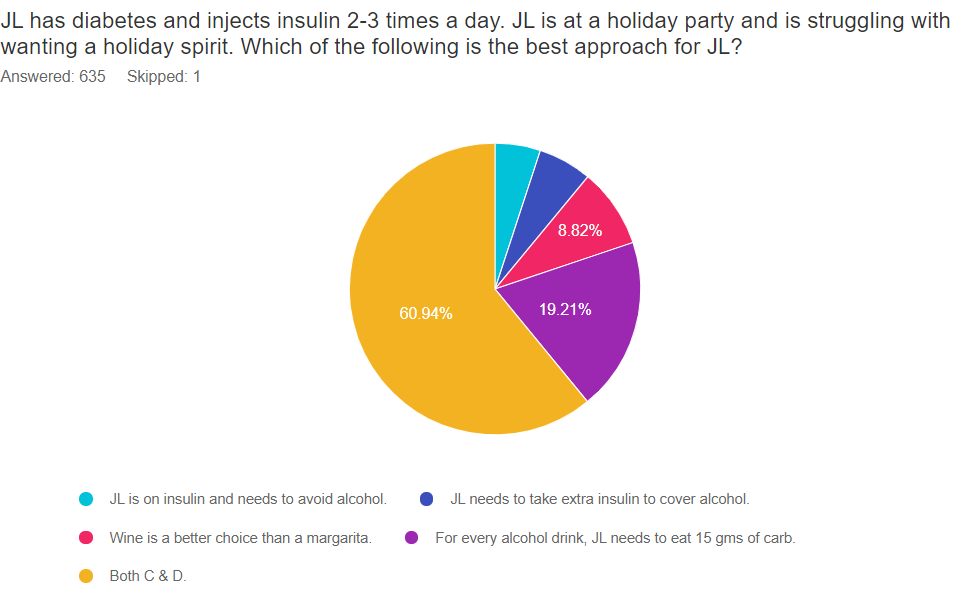Question of the Week | December 15, 2020

JL is a 78-year-old with type 2 diabetes who has been taking metformin 1000mg BID for the past year. She checks her BG each morning and says it usually ranges from 100 – 138. Her most recent A1c came back at 9.6% and the provider started her on dapagliflozin (Farxiga) 5 mg daily two days ago. JL arrives at the clinic in a panic and says she has been checking her blood glucose 3 times a day it has “jumped up to 236 and 242”. The diabetes specialist double-checked and verified random glucose of 249. What is the best explanation?
What is the best answer?
- Dapagliflozin is associated with transient hyperglycemia.
- Double-check kidney function to verify GFR is adequate.
- Discovery of hyperglycemia due to random BG checks.
- Hyperglycemia due to the initiation of steroid therapy.
Click here to test your knowledge!
Level 1 – Diabetes Fundamentals 2021 Updates
This series is designed for health care professionals who are interested in getting started in diabetes education and for those actively working toward becoming a Certified Diabetes Care and Education Specialist. Each course in this series provides the critical building blocks and foundation for those entering the diabetes field. Plus, they prepare you to advance to our Level 2 Standards of Care Intensive Courses.
Join us for our 2021 Live Webinar Updates. All courses air at 11:30 a.m. (PST)
- January 12, 2021 – Class 1 – Getting to the Nitty Gritty 1.5 CEs
- January 14, 2021 – Class 2 -Nutrition and Exercise 1.5 CEs
- January 19, 2020 – Class 3 – Insulin Therapy & Pattern Management 1.5 CEs
- January 21, 2021 – Class 4 – Meds Overview for Type 2 – 1.5 CEs
- January 26, 2021 – Class 5 – Goals of Care 2020 – 1.5 CEs
- January 28, 2021 – Class 6 – Hypoglycemia, Sick Days, Monitoring, Foot Care 1.5 CEs

Instructor: Beverly Thomassian RN, MPH, CDCES, has been Board Certified in Advanced Diabetes Management for over 20 years. She is an Associate Clinical Professor at UCSF and Touro University and a nationally recognized diabetes expert.
Sign up for Diabetes Blog Bytes – we post one daily Blog Byte from Monday to Friday. And of course, Tuesday is our Question of the Week. It’s Informative and FREE! Sign up below!
[yikes-mailchimp form=”1″]
Accreditation: Diabetes Education Services is an approved provider by the California Board of Registered Nursing, Provider 12640, and Commission on Dietetic Registration (CDR), Provider DI002. Since these programs are approved by the CDR it satisfies the CE requirements for the CDCES regardless of your profession.*
The use of DES products does not guarantee the successful passage of the CDCES exam. CBDCE does not endorse any preparatory or review materials for the CDCES exam, except for those published by CBDCE.
Teen Designs Type 1 Diabetes App – T1D1
Drew Mendelow, 13, felt overwhelmed with all the new information he had to learn to navigate his new diagnosis of type 1 diabetes.
New Type 1 leads to new App
Since Drew already knew how to code games, he thought he could design an app that would help him track his insulin, blood sugars and carbohydrates consumed.
He ended up creating an app that would help with bolus insulin calculations and provide a shareable log.

Within months of diagnosis, Drew launched his new app T1D1. T1D1 stands for Type 1 diabetes from Day 1.
To make sure the T1D1 app is available for anyone with new type 1 diabetes, Drew is adamant his app remains free. “I want to make sure everyone can really use it.”
The T1D1 app has been rigorously evaluated by the Children’s Hospital in Washington D.C. It not only passed this detailed vetting process, but the team at Children’s Hospital is also recommending it to people and families with a new type 1 diagnosis.
Many people with type 1 diabetes are started on CGM and insulin pumps, eventually. These devices help determine insulin bolus doses. But for those who don’t yet have access to these tools or can’t afford these devices, the T1D1 app is very useful and designed by someone living with type 1 diabetes every day.
Coach Beverly’s impressions of T1D1 Bolus Calculator and Log
This easy-to-use app is available on google play or for iOS users. The set-up is straight forward and intuitive.
Users plug in their blood glucose and carbs, and the app determines how much insulin to take for any given meal or snack based on the user’s profile. This app greatly simplifies the process of determining needed insulin dose, plus keeps a record of glucose levels, carbs consumed and insulin delivered. In addition, this record can be easily emailed to providers or concerned family members.
Users can personalize their individual glucose target, the insulin-to-carb ratio at each meal /snack, and the correction ratio. They can also enter their most commonly consumed foods with custom serving sizes and carb amount, to create a personalized food library.
I love that this app is free, but users have the option to support Drew’s contribution to making a new diagnosis with type 1 just a little easier!
Diabetes Technology Toolkit – Earn 3.0 CEs

Perfect for those planning to take the CDCES / BC-ADM or for those who want to learn more about the technology used to manage diabetes.
As Diabetes Care and Education Specialists, we are expected to have expertise in diabetes technologies to improve person-centered care and optimize outcomes.
Yet, when it comes to insulin pumps, sensors, and calculations many of us feel overwhelmed and unsure about diabetes technology management. Coach Beverly created this 2-part Technology Toolkit to provide you with critical information on Insulin Pumps, Calculations, and Continuous Glucose Monitors.
If you want cutting edge information on diabetes technology, problem-solving, and using a formula to determine appropriate insulin dosing, we highly recommend this toolkit.
Sign up for Diabetes Blog Bytes – we post one daily Blog Byte from Monday to Friday. And of course, Tuesday is our Question of the Week. It’s Informative and FREE! Sign up below!
[yikes-mailchimp form=”1″]Accreditation: Diabetes Education Services is an approved provider by the California Board of Registered Nursing, Provider 12640, and Commission on Dietetic Registration (CDR), Provider DI002. Since these programs are approved by the CDR it satisfies the CE requirements for the CDCES regardless of your profession.*
The use of DES products does not guarantee the successful passage of the CDCES exam. CBDCE does not endorse any preparatory or review materials for the CDCES exam, except for those published by CBDCE.
Rationale of the Week | Alcohol and Holidays

Given that people with diabetes might have a drink or two during the season, we thought that this was an important topic to discuss further. Our December 1st Question of the week was a question of alcohol consumption during the holidays. Over 60% of respondents, chose the best answer.
Before we start though, if you don’t want any spoilers and haven’t tried the question yet, you can answer below: Answer Question
Question: JL has diabetes and injects insulin 2-3 times a day. JL is at a holiday party and is struggling with wanting a holiday spirit. Which of the following is the best approach for JL?
Answer Choices:
- A. JL is on insulin and needs to avoid alcohol.
- B. JL needs to take extra insulin to cover alcohol.
- C. Wine is a better choice than a margarita.
- D. For every alcohol drink, JL needs to eat 15 gms of carb.
- E. Both C & D.

As shown above, the most common choice was option 5, the second most common answer was option 4, then option 3, then option 2, and finally option 1.
Getting to the Best Answer
If you are thinking about taking the certification exam, the content of this practice test question will set you up for success. The exam questions won’t have 2 right answers, but alcohol and diabetes is expected content on the exam.
Answer 1 is incorrect. 5.04% chose this answer. “JL is on insulin and needs to avoid alcohol.” Based on the American Diabetes Association standards of care, people with diabetes on insulin can include alcohol as part of their meal plan.
The current recommendations are; women with diabetes limit their alcohol consumption to one drink a day or less and men with diabetes limit consumption to two or fewer drinks a day.
There are side effects to consider. Alcohol can worsen triglyceride levels, intensify neuropathic pain, and lead to unwanted weight gain. Plus, it can increase the risk of hypoglycemia. So, the decision to consume spirits is a person-centered decision, based on individual needs and health status.

One serving of alcohol =
- 5 ounces of wine
- 1.5 ounces of hard liquor
- 12-ounce beer
Answer 2 is incorrect. 5.98% of you chose this answer. “JL needs to take extra insulin to cover alcohol.” Alcohol can cause hypoglycemia for hours after consumption. Alcohol metabolism in the liver delays the release of glycogen stores and can lead to low circulating glucose levels. Some people with type 1 diabetes may even need to adjust their insulin dose at a meal if consuming alcohol.
People with type 1 diabetes need to be extra cautious if their before bed glucose is elevated after consuming alcohol. Before giving extra insulin to treat nighttime high glucose, remind them that glucose levels will trend down overnight with alcohol on board, and they probably don’t need that extra bolus of insulin.
Answer 3 is correct, but so is answer 4. “Wine is a better choice than a margarita.” Wine is a better choice since it does not have all the extra sugar and carbohydrates of a margarita. Wine consumption has a more predictable outcome whereas figuring out how much carbohydrate is in a margarita can be tricky. Mixed sugary drinks may cause blood glucose levels to rise initially than drop, later on, making management more difficult.
Answer 4 is correct, but so is answer 3. “For every alcohol drink, JL needs to eat 15 gms of carb.” Since we know that alcohol can lead to hypoglycemia for those who are on insulin therapy or take a sulfonylurea, coupling each of their favorite adult beverages with 15 gms of carb can prevent unwanted hypoglycemia.
Another issue is that the signs of hypoglycemia can mirror the signs of intoxication. Encourage people to keep a close eye on their CGM or meter results when imbibing. And include their friends in on helping to detect and treat hypoglycemia to keep safe during celebrations.
Answer 5 is correct. 60.94% chose this answer. “Both C & D.”
We hope you appreciate this week’s rationale! Thank you so much for taking the time to answer our Question of the Week and participate in this fun learning activity!
Want more exam practice questions? Enroll in our Test Taking Toolkit with 220+ Practice Questions!
“This is one of the best review courses I’ve ever taken.”
“I learned so much from the CDCES Exam Prep Toolkit. I now have an assessment after taking the practice exam on the areas I need to focus my studying.”
Student Feedback

Whether you are preparing for the CDCES or BC-ADM exam, this test-taking toolkit is designed to prepare you for success. This toolkit includes two courses with over 200 practice questions to help you prepare and simulate the exam. Plus, we have added a FREE bonus course, Language, and Diabetes – What we say matters. Coach Beverly added this course because she believes it contains critical content for the exam and for our clinical practice!
Sign up for Diabetes Blog Bytes – we post one daily Blog Byte from Monday to Friday. And of course, Tuesday is our Question of the Week. It’s Informative and FREE! Sign up below!
[yikes-mailchimp form=”1″]Accreditation: Diabetes Education Services is an approved provider by the California Board of Registered Nursing, Provider 12640, and Commission on Dietetic Registration (CDR), Provider DI002. Since these programs are approved by the CDR it satisfies the CE requirements for the CDCES regardless of your profession.*
The use of DES products does not guarantee the successful passage of the CDCES exam. CBDCE does not endorse any preparatory or review materials for the CDCES exam, except for those published by CBDCE.
Question of the Week | What Intervention is Needed?

A 12-year-old with new-onset hyperglycemia presents to the Emergency Room with positive urine ketones and blood sugar of 283. What action is required most immediately?
What is the best answer?
- Contact dietitian to provide macronutrient review.
- Start a person with diabetes on Metformin (Glucophage).
- Draw ABGs and antibodies.
- Provide insulin therapy.
Click here to test your knowledge!
Level 1 – Diabetes Fundamentals 2021 Updates
This series is designed for health care professionals who are interested in getting started in diabetes education and for those actively working toward becoming a Certified Diabetes Care and Education Specialist. Each course in this series provides the critical building blocks and foundation for those entering the diabetes field. Plus, they prepare you to advance to our Level 2 Standards of Care Intensive Courses.
Join us for our 2021 Live Webinar Updates. All courses air at 11:30 a.m. (PST)
- January 12, 2021 – Class 1 – Getting to the Nitty Gritty 1.5 CEs
- January 14, 2021 – Class 2 -Nutrition and Exercise 1.5 CEs
- January 19, 2020 – Class 3 – Insulin Therapy & Pattern Management 1.5 CEs
- January 21, 2021 – Class 4 – Meds Overview for Type 2 – 1.5 CEs
- January 26, 2021 – Class 5 – Goals of Care 2020 – 1.5 CEs
- January 28, 2021 – Class 6 – Hypoglycemia, Sick Days, Monitoring, Foot Care 1.5 CEs

Instructor: Beverly Thomassian RN, MPH, CDCES, has been Board Certified in Advanced Diabetes Management for over 20 years. She is an Associate Clinical Professor at UCSF and Touro University and a nationally recognized diabetes expert.
Sign up for Diabetes Blog Bytes – we post one daily Blog Byte from Monday to Friday. And of course, Tuesday is our Question of the Week. It’s Informative and FREE! Sign up below!
[yikes-mailchimp form=”1″]
Accreditation: Diabetes Education Services is an approved provider by the California Board of Registered Nursing, Provider 12640, and Commission on Dietetic Registration (CDR), Provider DI002. Since these programs are approved by the CDR it satisfies the CE requirements for the CDCES regardless of your profession.*
The use of DES products does not guarantee the successful passage of the CDCES exam. CBDCE does not endorse any preparatory or review materials for the CDCES exam, except for those published by CBDCE.
National Diabetes Month Helpful Resources
To celebrate National Diabetes Month, we are excited to provide you with a bunch of helpful resources to help get the word out.

Websites that offer FREE handouts for diabetes education
ADA’s FREE Living with Type 2 Diabetes Program: ADA’s program includes six digital, printable journeys to teach how to live well with diabetes; a monthly e-newsletter with tips, stories, and more resources; six free issues of the Diabetes Forecast® magazine; access to an online community and local events. (The program is available in both English and Spanish).
Insulin Cost Savings Toolkit Resource Page – A complete listing of low cost insulin options.
ADA Diabetes Education Library Offers over 170 topics on diabetes that are searchable by topic and language. A treasure trove of educational info.
CDC Diabetes Prevention Program Curricula and Handouts This site offers excellent resources for those interested in offering Diabetes Prevention Education.
National Diabetes Education Program is an online library of resources compiled by the NDEP to help provide accurate information and support for people living with prediabetes and diabetes.
Type 1 Diabetes Resource Page – Includes is a list of helpful online resources for Type 1 Diabetes. It include sites for national organizations like the American Diabetes Association (ADA), sites for diabetes interest groups, and other participant organizations that provide helpful diabetes tips and opportunities to join online groups.
Other Great Resources
- ADA’s Risk Quiz: 60-second online risk assessment for type 2 diabetes. ADA created a self-assessment and a version to fill out the assessment for others. There’s also a printable version in English & Spanish that can be distributed to help ascertain risk. This is a great first step in helping individuals consider coming in for an appointment
- Sweet People Club: Theresa Garnero founded the Sweet People Club which provides education, support, and community for individuals with prediabetes or type 2 and their families. She has excellent resources on meal planning and active living, plus she provides a free guide on flexible meal planning.
- Spanish Language Resources: language can be a barrier to adequate and quality care. ADCES has created a number of free downloads for people with diabetes and prediabetes, which have been translated into Spanish.
FREE Resource Catalog

See Full Free Resource Catalog
Sign up for Diabetes Blog Bytes – we post one daily Blog Byte from Monday to Friday. And of course, Tuesday is our Question of the Week. It’s Informative and FREE! Sign up below!
[yikes-mailchimp form=”1″]Accreditation: Diabetes Education Services is an approved provider by the California Board of Registered Nursing, Provider 12640, and Commission on Dietetic Registration (CDR), Provider DI002. Since these programs are approved by the CDR it satisfies the CE requirements for the CDCES regardless of your profession.*
The use of DES products does not guarantee the successful passage of the CDCES exam. CBDCE does not endorse any preparatory or review materials for the CDCES exam, except for those published by CBDCE.
Getting to the Gut, Meet Your Microbiome | Free Webinar and Celebration
November is National Diabetes Month. We are celebrating with our annual Gut Bacteria Webinar. Join Us!
FREE Webinar – Getting to the Gut, Meet Your Microbiome
Join the wonderment as we explore the role of our Microbiome.

“This Webinar is filled with Bev’s energy, knowledge, and passion for diabetes that she replicates in all her teachings. She puts a demand on herself to be a mentor to all. Her information is well organized, full of current/relevant research, and helps CDCES’ view into the future as a changing world impacts diabetics. I find her to be the most exciting and engaging educator and … OUTSTANDING teacher!!” – recent participant
This one-hour complimentary journey will expand your view of how the trillions of bacterial hitchhikers profoundly influence our health. We will discuss how foods, the environment, and our medical practices have impacted our gut bacteria over time and strategies we can take to protect these old friends.
Webinar topics:
- Discuss the latest research on our microbiome
- State the relationship between gut health and diabetes risk
- Describe 3 strategies to get our microbiome back to better health.
Studying for the CDCES exam?
Join us for our FREE webinar
Preparing for the CDCES Exam 2020

November 5, 2020, from 11:30 a.m. – 12:45 p.m. (PST)
Unsure about updates for the 2020 exam?
Coach Beverly offers this FREE webinar to help get you to prepare for the CDCES Exam. All her tips and tricks are meant to ease your mind and reflect the updates to the CDCES content outline.
Topics Covered Include:
- Implications of new certification name, CDCES for our specialty
- Exam requirement updates for 2020
- Exam eligibility and test format
- Strategies to succeed along with a review of study tips and test-taking tactics.
- We will review sample test questions and the reasoning behind choosing the right answers.
- Learn how to focus your time and prepare to take the CDCES Exam. We provide plenty of sample test questions and test-taking tips!
Instructor: Beverly Thomassian RN, MPH, CDCES, BC-ADM is a working educator who has passed her CDCES Exam 6 times. She is a nationally recognized diabetes expert for over 25 years.
See our Preparing for CDCES Resource Page >>
Sign up for Diabetes Blog Bytes – we post one daily Blog Byte from Monday to Friday. And of course, Tuesday is our Question of the Week. It’s Informative and FREE! Sign up below!
[yikes-mailchimp form=”1″]
Accreditation: Diabetes Education Services is an approved provider by the California Board of Registered Nursing, Provider 12640, and Commission on Dietetic Registration (CDR), Provider DI002. Since these programs are approved by the CDR it satisfies the CE requirements for the CDCES regardless of your profession.*
The use of DES products does not guarantee the successful passage of the CDCES exam. CBDCE does not endorse any preparatory or review materials for the CDCES exam, except for those published by CBDCE.
National Diabetes Month Resources | Focus on Youth

Taking Care of Youth Resources
Almost 200,000 people under the age of 20 are living with type 1 or type 2 diabetes. This makes diabetes the most common chronic condition in school-age youth in the United States.
Living with diabetes is challenging, no matter their age. Being a young person with diabetes presents the additional challenge of managing glucose during a period of intense hormonal fluctuations and the complexity of managing a social life, extra-curricular activities, and risk-taking behaviors. For caregivers, advocating for the rights of school-age children with diabetes can be time-consuming and full of challenges.
The National Institute of Health (NIH) and the National Institute of Diabetes and Digestive and Kidney Diseases (NIDDK), has put together a Toolkit for health care professionals and caregivers alike to help navigate this challenging time.
Health Professional Toolkit – To help raise awareness about the best care for youth with diabetes, this toolkit by the NIDDK, includes social media posts that you can easily copy and share.
Juvenile Diabetes Research Foundation – Type 1 Diabetes Resources and Support
Articles on NIDDK Website
Diabetes care and the Adolescent Population: Navigating the Transition of Roles and Responsibilities. In this Q & A session, David Schwartz, Ph.D., shares insights on how providers can facilitate shared responsibility for diabetes care while minimizing conflict between adolescents and their parents/guardians.
Managing Diabetes at School – In a perfect world, all teachers and other school staff would understand how to manage diabetes. In the reality, parents and caregivers need to provide information to the school and work with staff to keep children safe and healthy, no matter what the school day brings. This link includes information and a downloadable Diabetes Medical Management Plan.
The Role of the Community Environment in Managing Diabetes Risk – this diabetes discoveries and practice blog are full of interesting, short articles and presentations on a range of critical and timely topics. You can sign up to receive blog notifications too.
Guiding Principles for the Care of People with Diabetes – These Guiding Principles aim to identify and synthesize areas of general agreement among existing guidelines to help guide primary care providers and health care teams to deliver quality care to adults with or at risk for diabetes.
National Diabetes Month Helpful Resources
- ADA’s Risk Quiz: 60-second online risk assessment for type 2 diabetes. ADA created a self-assessment and aversion to fill out the assessment for others. There’s also a printable version in English & Spanish that can be distributed to help ascertain risk. This is a great first step in helping individuals consider coming in for an appointment
- Sweet People Club: Theresa Garnero founded the Sweet People Club which provides education, support, and community for individuals with prediabetes or type 2 and their families. She has excellent resources on meal planning and active living, plus she provides a free guide on flexible meal planning.
- Spanish Language Resources: language can be a barrier to adequate and quality care. ADCES has created a number of free downloads for people with diabetes and prediabetes, which have been translated into Spanish.
- Free Monofilaments: Lower Extremity Amputation Prevention (LEAP) provides monofilaments for free (just send them an envelope with postage!). Use these monofilaments, which delivers 10 grams of pressure, to identify those at risk of developing foot problems. (The ADA Foot Examination Pocket Chart fully explains how to conduct a foot exam, including a picture explanation of how to use a monofilament).
Websites that offer FREE handouts for diabetes education
ADA’s FREE Living with Type 2 Diabetes Program: ADA’s program includes six digital, printable journeys to teach how to live well with diabetes; a monthly e-newsletter with tips, stories, and more resources; six free issues of the Diabetes Forecast® magazine; access to an online community and local events. (The program is available in both English and Spanish).
ADA Diabetes Education Library Offers over 170 topics on diabetes that are searchable by topic and language. A treasure trove of educational info.
CDC Diabetes Prevention Program Curricula and Handouts This site offers excellent resources for those interested in offering Diabetes Prevention Education.
National Diabetes Education Program is an online library of resources compiled by the
Preparing for the CDCES Exam | Free Webinar | November 5, 2020
Studying for the CDCES exam?
Join us for our FREE webinar
Preparing for the CDCES Exam 2020

November 5, 2020, from 11:30 a.m. – 12:45 p.m. (PST)
Unsure about updates for the 2020 exam?
Coach Beverly offers this FREE webinar to help get you to prepare for the CDCES Exam. All her tips and tricks are meant to ease your mind and reflect the updates to the CDCES content outline.
Topics Covered Include:
- Implications of new certification name, CDCES for our specialty
- Exam requirement updates for 2020
- Exam eligibility and test format
- Strategies to succeed along with a review of study tips and test-taking tactics.
- We will review sample test questions and the reasoning behind choosing the right answers.
- Learn how to focus your time and prepare to take the CDCES Exam. We provide plenty of sample test questions and test-taking tips!
Instructor: Beverly Thomassian RN, MPH, CDCES, BC-ADM is a working educator who has passed her CDCES Exam 6 times. She is a nationally recognized diabetes expert for over 25 years.
See our Preparing for CDCES Resource Page >>
Sign up for Diabetes Blog Bytes – we post one daily Blog Byte from Monday to Friday. And of course, Tuesday is our Question of the Week. It’s Informative and FREE! Sign up below!
[yikes-mailchimp form=”1″]
Accreditation: Diabetes Education Services is an approved provider by the California Board of Registered Nursing, Provider 12640, and Commission on Dietetic Registration (CDR), Provider DI002. Since these programs are approved by the CDR it satisfies the CE requirements for the CDCES regardless of your profession.*
The use of DES products does not guarantee the successful passage of the CDCES exam. CBDCE does not endorse any preparatory or review materials for the CDCES exam, except for those published by CBDCE.








